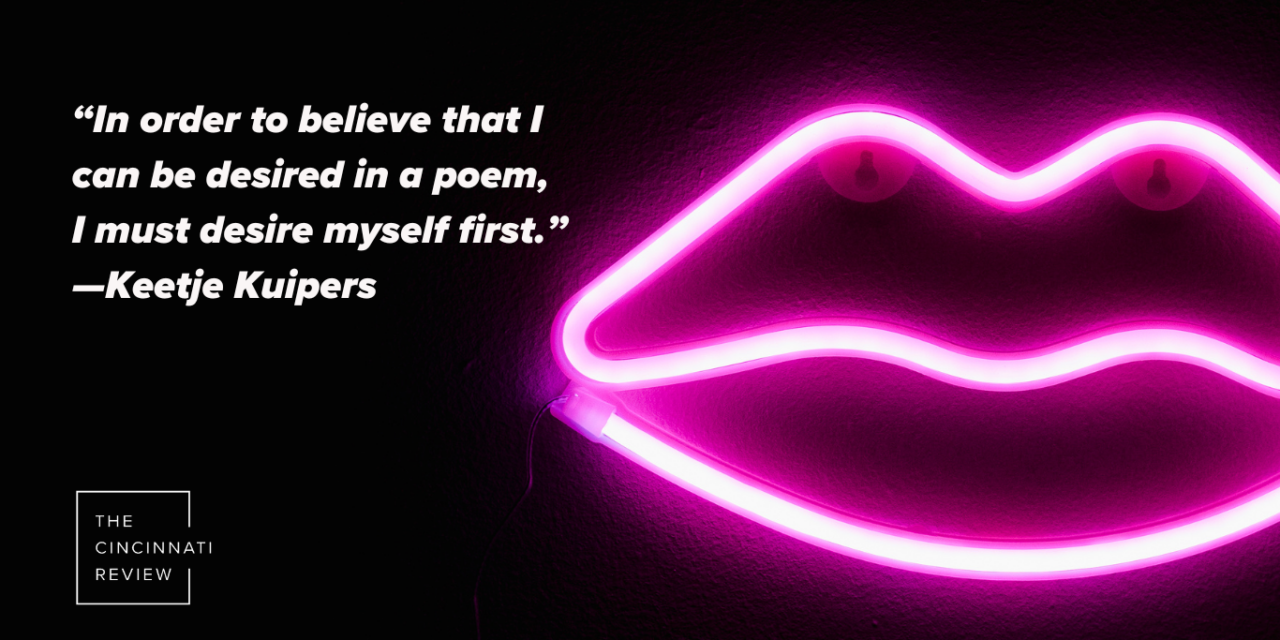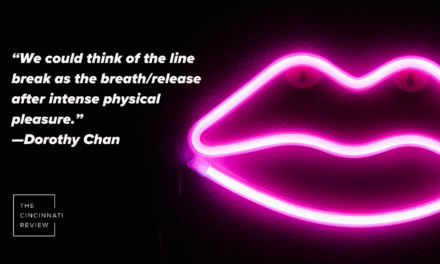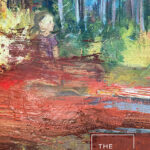To accompany our fall 2024 issue (21.2), we have curated a folio on writing about sex (reviews and craft essays) after noticing that several pieces in the print issue include sex, especially the play excerpt by Gloria Oladipo, John Fulton’s story “Emily Leaves Switzerland,” Karolina Letunova’s story “Turn Your Back to the Forest,” and poems by Keetje Kuipers herself and Jessica Nirvana Ram. We reached out to five writers to get their contribution to the conversation.
Here is Kuipers’s essay on the craft of writing poetry about sex:

“Breakwater”: On the Craft of Sex in Poetry
Past midnight, I’m awakened by plaintive moans. Two long and wavering cries, then silence. I’ve been staying this last week at a writer’s residency, four women banging around in an old house on the coast north of Boston. We take our meals together, walks alone, and, sometimes, listen in while one or another of us cries out in the night.
*
From my desk at the attic window, I watch the delivery truck drive up the long line of oaks. When I come downstairs, I find a large cardboard box labeled “live plant” and addressed to me. My wife has sent me flowers. Or, she has meant to send me flowers. Inside the box is what looks like a small azalea, any buds still closed tight against the world, and a mannered enamel tureen for me to place it in.
*
I am working on a poem about masturbation. Writing it is an act of daring myself to be seen—or fully heard or felt—not by others, but by myself.
*
Sound carries strangely in this stately seaside mansion with its back staircases and adjoining rooms. I can hear the silverware being loaded into the dishwasher when I’m writing in the upstairs alcove, or a telephone conversation happening in the sunroom at the other end of the house. The one place with seeming privacy is the bathroom, and we each have our own: four marble-floored chambers tucked under the eaves with a door that locks closed. This is where I keep my vibrator, perched beside the shampoo and conditioner, a purple silicone thumb extended in permanent curvature toward my body.
*
I go for a walk on the path edging the spit of land that juts out into the sea. On one side is open water, on the other the harbor. This time I trace the route backward, starting on the ocean side and making my way to the harbor’s little public beach. I see as I approach that two of my housemates are already there, gazing out at the low sun as it prepares to drop behind the sailboats held in the curve of the bay. “It’s our Keetje,” they cry out in greeting as I step toward them, saying my name the way it’s meant to be said, by which I mean, pronounced correctly and also with great affection.
*
In order to believe that I can be desired in a poem, I must desire myself first. I can’t write the poem where I have sex unless I believe in the sex, the same way I can’t press the vibrator to my own body with any hope of pleasure without believing my body deserves that pleasure.
*
I ask the woman who’s taken the room next to mine if she had a bad dream the night before. She looks at me with surprise. I tell her how I’d thrown on my robe and stumbled out into the hall looking for the source of this familiar sound of distress. Familiar because it is a sound I make when, on occasion, my mind wakes but leaves my body behind and I am a creature trapped in a living coffin with only one way to tear myself out: the sound of my own voice.
*
Though it mostly stays in my sock drawer when I’m home, whenever I’m headed to a residency I never forget to pack—along with my laptop cord, pencil case, and journal—my vibrator. Along with daily walks, it reminds me to be in my body even as I remain deeply preoccupied with the concerns of the mind.
*
If sexuality and desire are, as I believe, a performance, then I am writing toward a performance of my truest self.
*
Also on the beach are three older women, all huddled in wet towels. “Is it cold?” I ask. “No, it’s warm,” the one nearest to me says. “You should go in.”
*
My wife explains that she chose the gardenia plant—not azaleas after all—for their scent. She imagined the small shrub in full bloom, the white petals releasing something intoxicating into the air, like mailing me a long-distance aphrodisiac. I don’t want to tell her that the plant isn’t in flower, as if its bodily refusal reflects poorly on me, the sealed mouths of each small green head somehow more precisely what I deserve than the freedom of bloom.
*
“But I always sleep alone,” says the woman in the adjoining room, “so I don’t know what I sound like.”
*
I slip off my shoes and socks, step out of my pants, and pull my sweatshirt over my head. My T-shirt comes down below my hips, and I tell myself that wearing my bra and underwear into the water is no different than wearing a bikini—I keep the T-shirt on because even if I were wearing a bikini, I wouldn’t let anyone see me in it.
*
The converse of owning my desire is shame. And shame performed by the body is a closing in, a turning away, until the buds die before they can flower. Something beautiful trapped inside a closed body.
*
Warm is not how I would describe the water, nor is it cold. I walk in easily, not holding my breath or having to will myself deeper. I’m surprised by how clear it is, that after the rocks of the shore, it turns to fine white sand beneath my feet as I walk out farther. Soon I am floating on my back, letting the sky and the water touch me simultaneously, kissing me—kissing myself—all over.
*
A poem lives in the body before it lives on the page. Its rhythm rises from the torn breath, the heart’s chaotic beat, the unpredictable swell of waves beneath a prone form, the pulsing hum of water coursing through the retractable showerhead to meet the skin, or the not-quite-even drumroll of a pair of footfalls on a beachside path. To successfully make the transition to the page without the poem losing its inherent embodiment—its lived music—requires a commitment to imperfection and surprise, to being overtaken, to losing, at some point, the control that many writers hold dear.
*
There’s a storm overnight, and the next day the sea is punctuated by rogue waves that sneak up on the breakwater, one even sweeping a woman off the embankment and briefly into the frothy soup of seaweed and effluence, where she bobs in surprise before being fished out.
*
“Maybe,” I say to my housemate, “you were having a good dream.”
Keetje Kuipers’s fourth collection of poetry, Lonely Women Make Good Lovers (BOA Editions, 2025), was the recipient of the Isabella Gardner Award. Her poetry and prose have appeared in The New York Times Magazine, The American Poetry Review, and Poetry, and have been honored by publication in The Pushcart Prize and Best American Poetry anthologies. Keetje has been a Stegner Fellow, Bread Loaf Fellow, and the Margery Davis Boyden Wilderness Writing Resident. She lives with her wife and children in Montana, where she is Editor of Poetry Northwest.











